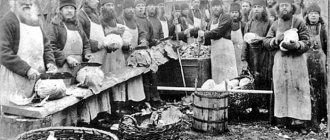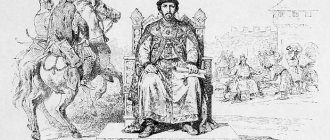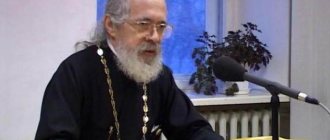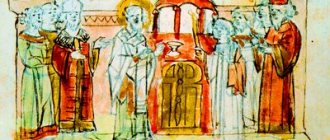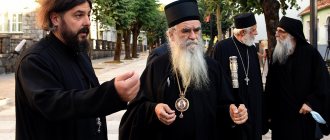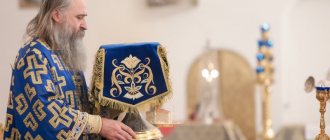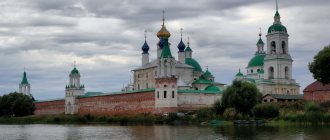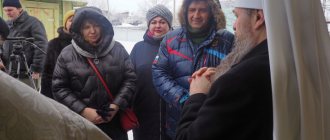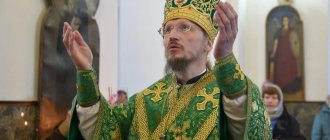| Metropolitan Barsanuphius (Sudakov) |
Barsanuphius (Sudakov)
(born 1955), Metropolitan of St. Petersburg and Ladoga, head of the St. Petersburg Metropolis, permanent member of the Holy Synod of the Russian Orthodox Church, member of the Presidium of the Inter-Council Presence of the Russian Orthodox Church, Chairman of the Commission on Church Administration and Mechanisms for the Implementation of Conciliarity in the Inter-Council Church presence, member of the Commission on the Organization of the Life of Monasteries and Monasticism of the Inter-Council Presence, member of the Supreme Church Council of the Russian Orthodox Church In the world Anatoly Vladimirovich Sudakov, was born on June 3, 1955 in the village of Malinovka, Arkadak district, Saratov region, into a large peasant family. He received his initial religious education from his mother Antonina Leontievna Sudakova-Pozorova, who was distinguished by her particular piety.
In 1972 he graduated from Malinovskaya secondary school and for a year worked in his village as a postman and at a brick factory.
In the fall of 1973, he was drafted into the army and sent to a group of Soviet forces in Germany, where he served as a mechanic-driver of medium tanks in the military units of Brandenburg and Potsdam.
In November 1975, after demobilization from the army, he got a job as an altar boy at the Archangel Michael Cathedral in the city of Serdobsk, Penza region, where the rector was one of the most prominent clergy of the Penza and Saransk diocese, Archimandrite Modest (Kozhevnikov).
In 1976 he entered the Moscow Theological Seminary and successfully graduated in 1979, in three years instead of four. Already at the seminary, he finally decided to connect his fate with monasticism: in October 1977, he was accepted as a novice into the brotherhood of the Trinity-Sergius Lavra.
On March 30, 1978, he was tonsured a monk by the abbot of the Lavra, Archimandrite Jerome (Zinoviev), and named in honor of St. Barsanuphius, Bishop of Tver. On April 27 of the same year, Archbishop Vladimir of Dmitrov was ordained to the rank of hierodeacon, on November 26, 1978, by him to the rank of hieromonk, and in 1982 he was elevated to the rank of abbot.
At the Lavra he had a close friendship with the confessors of the monastery, Archimandrites Kirill (Pavlov) and Naum (Baiborodin). His immediate spiritual superiors were the sacristan Archimandrite Aristarchus (Stankevich); dean, and then viceroy, Archimandrite Eusebius (Savvin); Dean Archimandrite Mark (Petrovtsy). They largely determined and influenced his life path.
From 1978 to 1982 he was assistant sacristan, and from 1982 to 1986 he was assistant dean.
From 1982 to 1986 he studied at the Moscow Theological Academy, defended his dissertation for the degree of candidate of theology. The head of the scientific work was Archimandrite Innokenty (Prosvirnin). The topic of scientific research was Mount Athos.
After graduating from the academy, he was sent to pastoral service in the Penza diocese at the request of Bishop of Penza and Saransk Seraphim (Tikhonov).
From September 15, 1986 to June 15, 1988 - rector of the Kazan Church in the city of Kuznetsk, Penza region.
In 1987 he was elevated to the rank of archimandrite.
From June 15, 1988 to February 7, 1991 - rector of the Assumption Cathedral in the city of Penza, secretary of the Penza diocesan administration. His spiritual mentor during these years was Archbishop of Penza and Saransk Seraphim (Tikhonov).
In 1988 and 1990 he was a participant in the Local Councils of the Russian Orthodox Church.
On January 29-31, 1991, by resolution of the Holy Synod, he was determined to be the bishop of the newly formed Saransk diocese.
On February 8 of the same year, he was consecrated Bishop of Saransk and Mordovia. The ordination in the Moscow Epiphany Cathedral was led by Patriarch Alexy II of Moscow and All Rus'.
On February 15 of the same year he arrived in Saransk.
From July 3 to December 28, 2000, he temporarily ruled the Penza diocese [1].
| Archbishop Barsanuphius (Sudakov) |
On February 22, 2001, he was elevated to the rank of archbishop.
On March 31, 2009, he was appointed acting manager of the affairs of the Moscow Patriarchate, a permanent member of the Holy Synod ex officio. On December 25 of the same year, he was confirmed as manager of the affairs of the Moscow Patriarchate.
From May 27, 2009 to 2013 - Chairman of the newly formed Award Commission under the Patriarch of Moscow and All Rus' [2].
On July 27, 2009, he became a member and presidium of the Inter-Council Presence of the Russian Orthodox Church. Since January 29, 2010 - Chairman of the Commission on Issues of Church Administration and Mechanisms for the Implementation of Conciliarity in the Church, Member of the Commission on Issues of Organizing the Life of Monasteries and Monasticism of the Inter-Council Presence [3].
On February 1, 2010, he was elevated to the rank of metropolitan.
On March 22, 2011, he became a member of the newly formed Supreme Church Council of the Russian Orthodox Church [4] ex officio.
On October 6, 2011, he was appointed head of the Mordovian Metropolis.
On October 4, 2012, he was confirmed as the holy archimandrite of the Saransk St. John the Theological Monastery [5].
On March 19, 2014, he was transferred to the St. Petersburg and Ladoga See and appointed head of the St. Petersburg Metropolis, a permanent member of the Holy Synod with temporary retention of the post of manager of the affairs of the Moscow Patriarchate [6].
On February 26, 2022, he was relieved of his post as manager of the affairs of the Moscow Patriarchate [7].
Essays
- Barsanuphius, Bishop of Saransk and Mordovia. Essays. - In 5 t.
- v.1. Return from oblivion. Reports, articles, speeches, appeals, interviews. - Saransk, 1995, 248 pp.;
- v.2. An exhortation to spiritual correction. Messages, sermons, teachings. - Saransk, 1995, 228 pp.;
- v.3. Athos in the life of the Russian Orthodox Church in the 19th - early 20th centuries. - Saransk, 1995, 176 pp.;
- v.4. Conviction of truth. Sermons. - Saransk, 1995, 200 pp.;
- v.5. Lessons of a grace-filled life. Sermons. - Saransk, 1996, 216 p.
He is also the author of numerous articles and messages.
Childhood and youth
In the summer of 1955, another boy was born into the peasant family of the Sudakovs in the Saratov region, the village of Malinovka, who was named with the sonorous name Anatoly. The family was very devout; their mother, Antonina Leontyevna, especially carefully raised their children in the Orthodox faith, regularly taking them to church and giving the children a primary church education.
The Sudakovs were raised simply in the family, taught to work from an early age, so immediately after graduating from secondary school in 1972, Anatoly worked in the village as a postman, while working part-time at a brick factory.
The youth of the future metropolitan came at a time of new repressions in the USSR regarding the Orthodox Church - Nikita Khrushchev, who came to power, launched a new wave of oppression and arrests of priests, hoping to completely destroy Christianity in the country.
Nevertheless, Anatoly grew up as a believing young man, although he went to serve his military service - in 1973-1975. he served in the German Democratic Republic as a tank driver and mechanic.
Awards
Church:
- memorial patriarchal panagia (2000, from Patriarch Alexy II)
- memorial patriarchal panagia (April 24, 2013, from Patriarch Kirill in honor of the name day and the 35th anniversary of service in the priesthood) [8]
- patriarchal charter
- medal of St. Sergius of Radonezh 1st, 2nd and 3rd degree
- Order of Equals book Vladimir III degree
- Order of the Blessed Prince Daniil of Moscow II degree (2008)
- Order of St. Sergius of Radonezh, 1st degree (2012) [9]
Secular:
- Certificate of honor of the Republic of Mordovia
- Russian State Order of Friendship (2002)
- medal "300 years of the Russian Navy"
- Medal "For Merit in Conducting the All-Union Population Census"
- Order of Merit, 3rd degree (2013, Ukraine, in honor of the 1025th anniversary of the Baptism of Rus) [10]
The beginning of spiritual ascent
Immediately after his tonsure as a monk, Metropolitan Barsanuphius began climbing the steps of the church hierarchy. Within a month he was ordained to the rank of hierodeacon, and after another six months to the rank of hieromonk. After that, until 1982, he served as an assistant sacristan.
During these years, his efficiency and perseverance surprisingly manifested themselves. Having set himself the goal of obtaining theological education, Abbot Barsanuphius, without interrupting the performance of his main duties, managed to graduate from the seminary in three years, instead of the required four, which allowed him to enter the Moscow Theological Academy in 1982.
Excerpt characterizing Barsanuphius (Sudakov)
“Listen, I didn’t drink,” the German doctor said to the adjutant, “so that after the third blow there was nothing left.” – What a fresh man he was! - said the adjutant. – And who will this wealth go to? – he added in a whisper. “There will be a okotnik,” the German answered, smiling. Everyone looked back at the door: it creaked, and the second princess, having made the drink shown by Lorren, took it to the sick man. The German doctor approached Lorrain. - Maybe it will last until tomorrow morning? - asked the German, speaking bad French. Lorren, pursing his lips, sternly and negatively waved his finger in front of his nose. “Tonight, not later,” he said quietly, with a decent smile of self-satisfaction in the fact that he clearly knew how to understand and express the patient’s situation, and walked away. Meanwhile, Prince Vasily opened the door to the princess’s room. The room was dim; only two lamps were burning in front of the images, and there was a good smell of incense and flowers. The entire room was furnished with small furniture: wardrobes, cupboards, and tables. The white covers of a high down bed could be seen from behind the screens. The dog barked. - Oh, is it you, mon cousin? She stood up and straightened her hair, which had always, even now, been so unusually smooth, as if it had been made from one piece with her head and covered with varnish. - What, did something happen? – she asked. “I’m already so scared.” - Nothing, everything is the same; “I just came to talk to you, Katish, about business,” said the prince, wearily sitting down on the chair from which she had risen. “How did you warm it up, however,” he said, “well, sit here, causons.” [let's talk.] - I was wondering if something had happened? - said the princess and with her unchanged, stone-stern expression on her face, she sat down opposite the prince, preparing to listen. “I wanted to sleep, mon cousin, but I can’t.” - Well, what, my dear? - said Prince Vasily, taking the princess’s hand and bending it downwards according to his habit. It was clear that this “well, what” referred to many things that, without naming them, they both understood. The princess, with her incongruously long legs, lean and straight waist, looked directly and dispassionately at the prince with her bulging gray eyes. She shook her head and sighed as she looked at the images. Her gesture could be explained both as an expression of sadness and devotion, and as an expression of fatigue and hope for a quick rest. Prince Vasily explained this gesture as an expression of fatigue. “But for me,” he said, “do you think it’s easier?” Je suis ereinte, comme un cheval de poste; [I'm as tired as a post horse;] but still I need to talk to you, Katish, and very seriously. Prince Vasily fell silent, and his cheeks began to twitch nervously, first on one side, then on the other, giving his face an unpleasant expression that had never appeared on Prince Vasily’s face when he was in the living rooms. His eyes were also not the same as always: sometimes they looked brazenly joking, sometimes they looked around in fear. The princess, holding the dog on her knees with her dry, thin hands, looked carefully into the eyes of Prince Vasily; but it was clear that she would not break the silence with a question, even if she had to remain silent until the morning. “You see, my dear princess and cousin, Katerina Semyonovna,” continued Prince Vasily, apparently not without an internal struggle as he began to continue his speech, “in moments like now, you need to think about everything.” We need to think about the future, about you... I love you all like my children, you know that. The princess looked at him just as dimly and motionlessly. “Finally, we need to think about my family,” Prince Vasily continued, angrily pushing the table away from him and not looking at her, “you know, Katisha, that you, the three Mamontov sisters, and also my wife, we are the only direct heirs of the count.” I know, I know how hard it is for you to talk and think about such things. And it’s not easier for me; but, my friend, I’m in my sixties, I need to be prepared for anything. Do you know that I sent for Pierre, and that the count, directly pointing to his portrait, demanded him to come to him? Prince Vasily looked questioningly at the princess, but could not understand whether she was understanding what he told her, or simply looking at him... “I never cease to pray to God for one thing, mon cousin,” she answered, “that he would have mercy on him and would have let his beautiful soul calmly leave this... “Yes, that’s so,” Prince Vasily continued impatiently, rubbing his bald head and again angrily pulling the table that had been pushed aside, “but finally... finally the thing is, you yourself know that last winter The count wrote a will, according to which he gave all his estate, in addition to the direct heirs and us, to Pierre. “You never know how many wills he wrote!” – the princess said calmly. “But he couldn’t bequeath to Pierre.” Pierre is illegal. “Ma chere,” said Prince Vasily suddenly, pressing the table to himself, perking up and starting to speak quickly, “but what if the letter was written to the sovereign, and the count asks to adopt Pierre?” You see, according to the Count’s merits, his request will be respected... The princess smiled, as people smile who think they know the matter more than those with whom they are talking. “I’ll tell you more,” continued Prince Vasily, grabbing her hand, “the letter was written, although not sent, and the sovereign knew about it.” The only question is whether it is destroyed or not. If not, then how soon will it all be over,” Prince Vasily sighed, making it clear what he meant by the words everything will end, “and the count’s papers will be opened, the will with the letter will be handed over to the sovereign, and his request will probably be respected. Pierre, as a legitimate son, will receive everything. – What about our unit? - asked the princess, smiling ironically, as if anything but this could happen. – Mais, ma pauvre Catiche, c'est clair, comme le jour. [But, my dear Katish, it is clear as day.] He alone is then the rightful heir of everything, and you will not get any of this. You must know, my dear, whether the will and letter were written and whether they were destroyed. And if for some reason they are forgotten, then you must know where they are and find them, because... - That’s all that was missing! – the princess interrupted him, smiling sardonically and without changing the expression of her eyes. - I am a woman; according to you, we are all stupid; but I know so well that an illegitimate son cannot inherit... Un batard, [Illegitimate,] - she added, hoping with this translation to finally show the prince his groundlessness. - Don’t you understand, finally, Katish! You are so smart: how do you not understand - if the count wrote a letter to the sovereign in which he asks him to recognize his son as legitimate, it means that Pierre will no longer be Pierre, but Count Bezukhoy, and then he will receive everything in his will? And if the will and the letter are not destroyed, then there will be nothing left for you except the consolation that you were virtuous et tout ce qui s'en suit [and everything that follows from here]. It's right. – I know that the will has been written; but I also know that it is invalid, and you seem to consider me a complete fool, mon cousin,” said the princess with the expression with which women speak when they believe that they have said something witty and insulting. “You are my dear Princess Katerina Semyonovna,” Prince Vasily spoke impatiently. “I came to you not to pick a fight with you, but to talk about your own interests as with my dear, good, kind, true relative.” I’m telling you for the tenth time that if a letter to the sovereign and a will in favor of Pierre are in the count’s papers, then you, my dear, and your sisters, are not the heir. If you don’t believe me, then trust people who know: I just spoke with Dmitry Onufriich (he was the house’s lawyer), he said the same thing. Apparently something suddenly changed in the princess’s thoughts; her thin lips turned pale (the eyes remained the same), and her voice, while she spoke, broke through with such peals that she, apparently, herself did not expect. “That would be good,” she said. – I didn’t want anything and don’t want anything. She threw her dog off her lap and straightened the folds of her dress. “That’s gratitude, that’s gratitude to the people who sacrificed everything for him,” she said. - Wonderful! Very good! I don't need anything, prince. “Yes, but you are not alone, you have sisters,” answered Prince Vasily. But the princess did not listen to him. - Yes, I knew this for a long time, but I forgot that except for baseness, deception, envy, intrigue, except ingratitude, the blackest ingratitude, I could not expect anything in this house... - Do you know or do you not know where this will is? - asked Prince Vasily with an even greater twitching of his cheeks than before. – Yes, I was stupid, I still believed in people and loved them and sacrificed myself. And only those who are vile and nasty succeed. I know whose intrigue it is. The princess wanted to get up, but the prince held her hand. The princess had the appearance of a person who had suddenly become disillusioned with the entire human race; she looked angrily at her interlocutor. “There is still time, my friend.” You remember, Katisha, that all this happened by accident, in a moment of anger, illness, and then forgotten. Our duty, my dear, is to correct his mistake, to make his last moments easier by preventing him from committing this injustice, not allowing him to die in the thoughts that he made those people unhappy... “Those people who sacrificed everything for him,” she picked up. The princess tried to get up again, but the prince did not let her in - something he never knew how to appreciate. No, mon cousin,” she added with a sigh, “I will remember that in this world one cannot expect a reward, that in this world there is neither honor nor justice.” In this world you have to be cunning and evil. - Well, voyons, [listen,] calm down; I know your beautiful heart. - No, I have an evil heart. “I know your heart,” the prince repeated, “I value your friendship and would like you to have the same opinion of me.” Calm down and parlons raison, [let's talk properly] while there is time - maybe a day, maybe an hour; tell me everything you know about the will, and, most importantly, where it is: you must know. We will now take it and show it to the count. He probably already forgot about it and wants to destroy it. You understand that my only desire is to sacredly fulfill his will; I just came here then. I'm only here to help him and you. – Now I understand everything. I know whose intrigue it is. “I know,” said the princess. - That’s not the point, my soul. - This is your protegee, [favorite,] your dear princess Drubetskaya, Anna Mikhailovna, whom I would not want to have as a maid, this vile, disgusting woman. – Ne perdons point de temps. [Let's not waste time.] - Ax, don't talk! Last winter she infiltrated here and said such nasty things, such nasty things to the Count about all of us, especially Sophie - I cannot repeat it - that the Count became ill and did not want to see us for two weeks. At this time, I know that he wrote this vile, vile paper; but I thought that this paper meant nothing. – Nous y voila, [That’s the point.] why didn’t you tell me anything before? – In the mosaic briefcase that he keeps under his pillow. “Now I know,” said the princess without answering. “Yes, if there is a sin behind me, a great sin, then it is hatred of this scoundrel,” the princess almost shouted, completely changed. - And why is she rubbing herself in here? But I will tell her everything, everything. The time will come! While such conversations took place in the reception room and in the princess's rooms, the carriage with Pierre (who was sent for) and with Anna Mikhailovna (who found it necessary to go with him) drove into the courtyard of Count Bezukhy. When the wheels of the carriage sounded softly on the straw spread under the windows, Anna Mikhailovna, turning to her companion with comforting words, was convinced that he was sleeping in the corner of the carriage, and woke him up. Having woken up, Pierre followed Anna Mikhailovna out of the carriage and then only thought about the meeting with his dying father that awaited him. He noticed that they drove up not to the front entrance, but to the back entrance. While he was getting off the step, two people in bourgeois clothes hurriedly ran away from the entrance into the shadow of the wall. Pausing, Pierre saw several more similar people in the shadows of the house on both sides. But neither Anna Mikhailovna, nor the footman, nor the coachman, who could not help but see these people, paid no attention to them. Therefore, this is so necessary, Pierre decided to himself and followed Anna Mikhailovna. Anna Mikhailovna walked with hasty steps up the dimly lit narrow stone staircase, calling Pierre, who was lagging behind her, who, although he did not understand why he had to go to the count at all, and even less why he had to go up the back stairs, but , judging by the confidence and haste of Anna Mikhailovna, he decided to himself that this was necessary. Halfway up the stairs, they were almost knocked down by some people with buckets, who, clattering with their boots, ran towards them. These people pressed against the wall to let Pierre and Anna Mikhailovna through, and did not show the slightest surprise at the sight of them. – Are there half princesses here? - Anna Mikhailovna asked one of them... - Here, - the footman answered in a bold, loud voice, as if now everything was already possible, - the door is on the left, mother. “Maybe the count didn’t call me,” Pierre said as he walked out onto the platform, “I would have gone to my place.” Anna Mikhailovna stopped to catch up with Pierre. - Ah, mon ami! - she said with the same gesture as in the morning with her son, touching his hand: - croyez, que je souffre autant, que vous, mais soyez homme. [Believe me, I suffer no less than you, but be a man.] - Really, I’ll go? - asked Pierre, looking affectionately through his glasses at Anna Mikhailovna. - Ah, mon ami, oubliez les torts qu'on a pu avoir envers vous, pensez que c'est votre pere... peut etre a l'agonie. – She sighed. – Je vous ai tout de suite aime comme mon fils. Fiez vous a moi, Pierre. Je n'oublirai pas vos interets. [Forget, my friend, what was wronged against you. Remember that this is your father... Maybe in agony. I immediately loved you like a son. Trust me, Pierre. I will not forget your interests.] Pierre did not understand anything; again it seemed to him even more strongly that all this should be so, and he obediently followed Anna Mikhailovna, who was already opening the door. The door opened into the front and back. An old servant of the princesses sat in the corner and knitted a stocking. Pierre had never been to this half, did not even imagine the existence of such chambers. Anna Mikhailovna asked the girl who was ahead of them, with a decanter on a tray (calling her sweet and darling) about the health of the princesses and dragged Pierre further along the stone corridor. From the corridor, the first door to the left led to the princesses' living rooms. The maid, with the decanter, in a hurry (as everything was done in a hurry at that moment in this house) did not close the door, and Pierre and Anna Mikhailovna, passing by, involuntarily looked into the room where the eldest princess and Prince Vasily. Seeing those passing by, Prince Vasily made an impatient movement and leaned back; The princess jumped up and with a desperate gesture slammed the door with all her might, closing it. This gesture was so unlike the princess’s usual calmness, the fear expressed on Prince Vasily’s face was so uncharacteristic of his importance that Pierre stopped, questioningly, through his glasses, looked at his leader. Anna Mikhailovna did not express surprise, she only smiled slightly and sighed, as if showing that she had expected all this. “Soyez homme, mon ami, c'est moi qui veillerai a vos interets, [Be a man, my friend, I will look after your interests.],” she said in response to his gaze and walked even faster down the corridor.
In the circle of wise mentors
Fulfilling the obediences assigned to him in the Trinity-Sergius Lavra, the future Metropolitan Barsanuphius relied in his works on the advice of wise mentors. Among them were the Lavra’s confessors, Archimandrites Naum and Kirill, the Lavra’s governor, Archimandrite Eusebius (Savvin), and many other people who shared their spiritual experience with him.
He also had to communicate closely with the future Patriarch of All Rus', and in those years Metropolitan of Tallinn and Estonia Alexy (Ridiger). Hegumen Barsanuphius met with him, and even ministered to him several times during his visits to the Pukhtitsky monastery in Estonia, where he regularly visited during the holidays.
Anatoly becomes a monk
The young man did not stay long in his native village and immediately went to work in the church. Already possessing a basic church education, he easily gets a job as an altar boy in the Church of the Archangel Michael in the city of Serdobsk, in the Penza region.
Anatoly works a lot and diligently, and shows interest in services. Seeing this, the rector of the temple, Archimandrite Modesta, advises the young man to receive a deeper spiritual education. Sudakov takes the priest’s advice and decides to become a monk and receive a secondary church education.
Assumption Cathedral in the city of Penza. For three years it was led by Father Barsanuphius
In 1976, Anatoly prepared the necessary documents and entered the Moscow Theological Seminary. Here he is completely imbued with the atmosphere of the educational institution and makes the final decision to become a monk. Here he will study for the next two years and, having received a diploma, will go to the place of his first obedience.
The young man was accepted into the service of the brotherhood of the Tritsko-Sergius Lavra. Until March 30, 1978, he served as a simple monk, but it was on this date that one of the most important events in Anatoly’s life happened. Archimandrite of the Lavra Jerome personally tonsured him as a monk. From then on, Anatoly was given the church name Barsanuphius, in honor of the saint and bishop of Tver Barsanuphius.
Links
Wikiquote has a page on the topic Barsanuphius (Sudakov)
RSFSR Veniamin (Kazansky) • Theodore (Pozdeevsky) • Gury (Stepanov) • Manuil (Lemeshevsky) • Venedikt (Plotnikov) •
Gabriel (Voevodin)
• Joseph (Petrovykh) •
Nikolai (Yarushevich)
• Seraphim (Chichagov) • Alexy (Simansky) • Grigory (Chukov) • Elevferiy (Vorontsov) • Pitirim (Sviridov) • Gury (Egorov) • Pimen (Izvekov) • Nikodim (Rotov) • Anthony (Melnikov) • Alexy (Ridiger) • John (Snychev)Russia John (Snychev) • Simon (Gethea) • Vladimir (Kotlyarov) •
Varsonofy (Sudakov)
